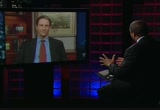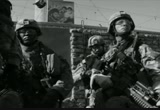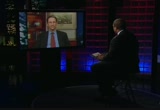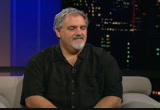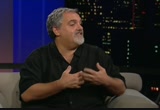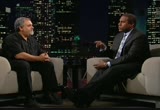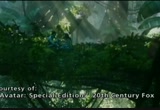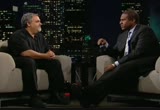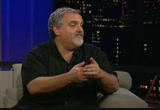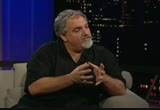tv Tavis Smiley PBS August 25, 2010 12:00pm-12:30pm EDT
12:00 pm
tavis: good evening from los angeles. i'm tavis smiley. with u.s. combat forces now out of iraq, there are new questions about the future of u.s. involvement in the region. first of tonight, a conversation about the future of iraq with david frankel, pulitzer prize- winning author of with the "washington post" and also author of the prize-winning text "the good soldiers." also, award winning movie maker john landau stops by. this began, a select release of "avatar" will be released. that is coming up right now. >> all i know is his name is james, and he needs extra help with his reading. >> i am james.
12:01 pm
>> yes. >> to everyone making a difference, you help us all live better. >> nationwide insurance proudly supports tavis smiley. tavis and nationwide insurance, working to improve financial literacy and the economic empowerment that comes with it. >> ♪ nationwide is on your side ♪ >> and by contributions to your pbs station from viewers like you. thank you. [captioning made possible by ♪ tavis: david frankel is a pulitzer prize-winning reporter and author of the "washington post" was best selling -- whose best-selling book is out in
12:02 pm
paperback and is called "the good soldiers." will come. >> thank you for having me. tavis: among the questions needing answers, not the least of which is how president obama goes about keeping -- taking credit for keeping a campaign promise without going so far as to say a "mission accomplished." and how you take credit but not say mission accomplished given that we do not know what will happen in the next few months? >> his speech is scheduled to be august 31, the last of the month and when combat operations come to an end. and we will commence operation new dawn. we will see what he does. it seems to me, though, that we have reached a moment where
12:03 pm
americans might feel comfortable walking away from this thing as if it is over, but is anything but over. tavis: when you say anything but over, you mean by that what? >> well, i mean it in three ways. we may have combat forces out of iraq at this point, but there was just another soldier death in the past 24 hours in southern iraq. number two, if you are an iraqi, life is not exactly great at this point. it is a politically unstable country. there are bombings every day. there is a lack of electricity. the living is not exactly what they thought it -- what they might have thought it would be. and number three, and perhaps most important for this conversation in this moment, is we it may be leaving iraq, but we are seeing more of this moving into american communities and we will see the effects of having more than 1 million soldiers return home. tavis: what you mean
12:04 pm
specifically? "the good soldiers" -- >> i guess the social fabric. suicides are up and the army is quite concerned about this, marines as well. the number of psychological injuries, posttraumatic stress disorder, traumatic brain injury from guys being rattled around in explosion after explosion, these are real serious consequences and some people may consider it the aftereffect of the war. to me, having been in the war and being able to watch it for a long time as an observer, these are things we will be dealing with for quite some time. tavis: this line of explanation you are offering now sounds awfully familiar with regard to what happened to the soldiers off after what happened in vietnam. if you are not suggesting to me that all these decades after vietnam we still have not figured out to re-enter the soldiers in american life? >> i think the army itself with
12:05 pm
knowledge we are still trying to figure this out. it is a work in progress. this was a tough war. it was a significant, syria's war. to understand what is -- serious war. to understand what is ahead, you have to understand that. the soldiers in baghdad as part of george w. bush's search, in many ways, they were at the worst of it. i am in touch with these guys all the time. almost any of them will tell you that the consequences of what they saw and in georgia and experienced a wave from american eyes as they fought every -- what they saw and in georgia and experienced away from american eyes as they fought in iraq is difficult to get away tavis: from tavis are these soldiers -- difficult to get away from. tavis: are the soldiers of to the task? >> they certainly are trained.
12:06 pm
i know a couple of years ago they could not do much at all and when push came to shove, in many cases, they just ran away. that is not the case anymore. violence is down and things are better. for anyone who is there, i think is reasonable for them to cross their fingers and hope that the iff will be able to step up. tavis: let me talk pure political strategy. the president is about to give a speech about the drawdown in iraq. joe biden was in indianapolis this week speaking to the vfw, veterans of foreign wars. what is your viewpoint on how the administration is taking credit for this and maybe how they are to do that since those two things may not be the same? >> one thing i try to do as a journalist is not to be a talking head and give advice. i'm curious to see how it goes down and plays out in the months
12:07 pm
ahead, especially with such important elections coming up. but to me, it is an appropriate time to pause in this and think of not what it is like to be a politician in this moment, but what it is like to be a soldier in this moment. how would feels to be a soldier and for this thing to have reached the moment it has reached. when obama was speaking -- i guess it was a week or two ago down in atlanta to disabled american veterans and he was talking about the end of combat operations by the end of the month, and is the speech because i was out at fort riley, kan. attending a welcome home ceremony. the latest group of the guys to come out of iraq back into kan. they walked into a gymnasium with cheering people, signed, it was just an emotional scene. these were -- but these soldiers who had shown up to see their friends coming home, it was a
12:08 pm
line of ptsd, traumatic brain injuries, guys who had been in bombing after bombing, were bleeding out of their years, having a hard time hearing -- bleeding out of their ears, having a hard time hearing. it is more important than ever to pay attention to the soldiers experience. tavis: that is the question that you put on the table earlier, how does it feel to be a soldier coming home? one would think i have to be happy to be out of this desert assignment, but you tell me. >> ok, fair enough. the year i spent in baghdad with a battalion of soldiers, think of these guys. it was 800 soldiers. the average age, 19 years old. most of these guys going out of the country for the first time and by a lot of the draw they get on planes and helicopters and the land in east baghdad in what turned out to be quite a vicious area. when they showed up, they were eager, they were filled with
12:09 pm
this naive sense of mission about what they were going to accomplish and they felt invincible. think of yourself when you were 19. by the time they came home 15 months later, and i think there experience represents so much of what a soldier goes through -- by the time they came home 15 months later after having seen buddies died, having seen friends lose feet, legs, hands, arms, is, been in daily -- eyes, been in daily mortar attacks, sniper attacks and roadside bombs, the sense of eagerness and optimism and mission was gone. even though they came home, in some cases, thinking they have accomplished a lot. in so many cases they were confused, and remained confused about what exactly that mission was and what exactly the purpose was. and that continues. tavis: if we are not prepared to
12:10 pm
welcome home appropriately -- and i mean that in every sense of the word. if we are not prepared to welcome home the male soldiers, then we certainly are not prepared to welcome home the female soldiers. the conditions are not yet ripe to appropriately welcome home female soldiers. what say you about that, given that we have a ninth -- an increasing number of female soldiers? >> i would hesitate to differentiate between the male and female at this point. it is one big lump of uncertainty. they all experienced things that we, in america, did not have to pay attention to. this was not a war that affected very many households directly. you know the statistics. maybe one out if 100 households had someone involved in the war. for most of us, 99 out of 100, this was a faraway war that we did not have to think about very much. tavis: i do not distinguish them
12:11 pm
for the purposes of suggesting that one sex endured more than the other sex. i only raise that because, you and i both know that we have not done a good job of being prepared to welcome home typically male soldiers. you start going down any list of things and you see very clearly we do not have the services, the va -- run the list. we do not have the capability for women veterans to be received home. and that is a pretty bold statements for me. it is not about distinguishing who did more or less. but i think you are right, all of these soldiers are going to come home and not receive the care that they need, but that is especially true for women soldiers. >> we will see how it goes. they released a report, a pretty tough report a couple of weeks ago. it was tough on themselves. it was taking the high number of suicides and tbi cases and ptsd cases as a wake-up call for
12:12 pm
themselves. if i can speak for them, basically, we have to make the culture better for everybody serving in the military, currently an previously, whether a man or woman. but pay attention to both and to special needs that every subcategory is going to have. tavis: finally, when will we know and how will we know whether or not this was all worth it? >> want to give a soldier, if i can reduce it to one story -- one particular soldier, if i can reduce it to one story, there was a guy that lost an eye because of a very complex assault in 2007. i remember catching up with him at the army medical center and one of the things he would do every day is stand in front of a mirror and just take out a knife and take our tweezers and to start picking pieces of shrapnel out of him because he said he did not want anything iraqi inside of him. i just talked to him the of the day and he said he would like to stay in the army and go fight in
12:13 pm
afghanistan, but at the same time, he still standing in front of the mirror and pieces of shrapnel are still standing in front of him. tavis: david finkel road a pulitzer prize-winning book as well as a new release, "the good soldiers." david, thank you for being with us. up next, john landau. john landau is an oscar-winning producer is resonate includes the two highest grossing films in all of a hollywood history, "titanic" and "avatar." here are some scenes from the special edition that will be released this week. >> this year, do not miss the biggest adventure of all time. dack on the big screen in 3
12:14 pm
with never before seen footage. for a limited time only. "avatar" in select cinemas. tavis: you guys keep doing this you might make some money off this film. [laughter] >> we were hoping. it was a big movie, tavis. tavis: this might push you into the green. [laughter] >> it might. but more importantly, we are trying to deliver something for the fans. the fans have said that they want to go back to pandora. that is what we try to deliver in this special edition. tavis: without giving anything away, what will we see here that is different? >> we tried to respond to what people really liked. there is more luminescence, more of the back story of grace's character, the school that she' taught in. we were really happy when we saw
12:15 pm
the movie. none of them feel like added scenes. they all embellish the stories and characters. tavis: you think most made this work? do you think it is the technology, or do you believe it was that strongly the story line? >> i think it was the story. movies are about stories, characters, and themes. we take in our move become a hero who is confined to a wheelchair, -- in our movie, a hero who was confined to a wheelchair, but he saves a planet. tavis: given all the stuff that you guys cannot see when you are working on a movie like this, the way abbott -- the way "avatar" was made, how do you know that is going to be something special, that is going to be something big? it is not like you can look at the daily shooting and decide it is working. how do you know over a number of years that you are onto something? >> it starts with a script.
12:16 pm
then we took a big leap of faith after the casting process. we were thrilled with are casting. but we waited almost three years into the process to see almost -- to see our first shot back on digital. tavis: how you wait three years to wait weather is good or not? >> the first scene we saw was when she first seascape with the bow. it was exactly what we wanted it to be. then we realized we had five shots and 2000 more to go. by hiring the right people around us we believe in them. we thought that they could deliver what we were asking. tavis: when you do something this monumental, in the end, -- you tell me, does it really matter whether you got picture of the year? >> no, and it did not matter on
12:17 pm
"titanic." we make movies for the audience. when i go to the movies, they are watching the screen and i am watching them. we got a positive reaction from the fans not just in north america, but globally. i have been around the world and this movie has reached an touched people universally. tavis: speaking of universally, if you are going to make money in this business these days, i read this all the time -- you have to have a story that can sail to your point around the world. what is it about this patika project that related not just here in the domestic-this particular project related not just here in the domestic box office, but around the world? >> i think this was a theme about a weakening, about realizing -- about a weakeniwak, about realizing the world around you. it did not preach and tell
12:18 pm
people what to do. it just open your eyes. tavis: we are starting now to get so much 3d that the specialness of it is going to be worn off. everybody is doing something in 3d now. >> i do not think so because 3d had something to the experience. it is just like stereo sound. we see our lives in 3d. i think the most compelling scenes in avatar whether or not see 3d in all ofmatic scenes.il our lives, our computer screens, mobile devices, home televisions, and of course, cinemas. tavis: and that is a good thing? >> i think is a good thing because we want to engage the audience. as narrative story tellers, the more immersive we can make the experience, the more engage the audience is. tavis: for lack of a better word, for the theatrical purist
12:19 pm
who looks at a film like avatar and says, you guys are just damming the notion of what it means to be an actor with all of this computer-generated stuff, you would say what? >> it is the opposite. our goal was to preserve the actor, to allow them to play roles that they could not otherwise play. these characters that you see up on the film are not decisions made by animators. these are decisions made by saldano and the other actors. to these characters and brought them to life. it is no different than an actor wearing prosthetics, makeup. the makeup of the 21st century is the cgi character. tavis: this is fascinating for me in reading more about your back story. you have done about 10 films now.
12:20 pm
i'm laughing already. how do you do -- to 10 films is not nothing, but it is 10 films. it is now 50, 60, 70, 80 films. how you do 10 films and two of them end up being the top grossing films in the history of the movie business? >> lucky enough to have hooked up with jim cameron. but i think that movies, for me, are about passion. it is not about just going out there and making a movie. it is making something that you feel passionate about and that you think will reach a universal audience. if someone asked me why titanic worked, i would say that -- if work because rose is in the frigid waters of the atlantic -- it worked because rose is in the frigid waters of the atlantic losing the love of her life, but she went on to live a full life. i think it works because you give them hope to those movies.
12:21 pm
tavis: kate and leo were just there. >> really, at that time, leo had not even come out with romeo and juliet get. he was not a big star. leo was a great everyman. he was a little bit jimmy stewart in titanic. and he was under credited. he should have gotten a nomination. tavis: speaking of "titanic," next year, 2011, the 100th anniversary of the titanic and you guys are putting something out? >> we are going to release the film in 3d. if you can shoot a movie in 3d, you should you did. but if you have a library title and you can take the time to do it right, so we got the right people involved and the audience will be exposed to it.
12:22 pm
tavis: what is the process for having the film that has already been made and turning it into 3d, number-one? and number two, on titanic specifically, what will we see that we did not to the first time? >> the processes were you take one image that you have any analyze it and you create a second eye. but why we see 3d is because we achieve -- two eyes. -- because we have two eyes. you can create the illusion of three. when you go to the movies, it is the illusion of treaty. it is not truly 3d. i think the 3d will literally put the audience on the ship and it will become much more tial.ience wil tavis: do ever worry that with a
12:23 pm
classic like titanic, do you worry that getting queued with it to -- getting cute with it like adding 3d will tarnish it? >> i worry when other people do it. for us, 3d is not coming out of a window. it is a window into a world. if you look at "avatar" there is no time that you are ducking. that takes you out of the movie. we will not let anything become too cutesy. tavis: as a producer in this town, do you like where this film industry as a business is headed? the direction? >> i do not know that i love it. we have always been a film business. i wonder if we are becoming a little bit the business film.
12:24 pm
we have to be in still that creative and allow people the opportunity to be unique, to take chances, to put out movies that are different on a small- scale and on a big scale. because i think that is what audiences want. they do not want just a sequel because it is easy to justify from a business standpoint, or a remake of a tv show. i would like to see more people taking chances. tavis: 30 seconds here. i'm not asking you to give away trade secrets, because you are too much -- to break for that. but have you and cameron are ready tried to figure what the next big thing is that you are going to try to pull off? but i think our next big challenges tried to do it " -- >> i think our next big challenge is to try to do an " avatar" sigel. we're talking about -- a sequel. we're talking about how to do it
12:25 pm
right. tavis: the two highest grossing films, "avatar" and "titanic." john, good to have you on. that is our show for tonight. thanks for tuning in. until next time, keep the faith. [captioning made possible by kcet public television] >> for more information on today's show, visit tavis smiley at pbs.org >> to join me next time for a look at new orleans, katrina after five years, plus how the midterm debate will affect the midterm elections. >> all i know is his name is james, and he needs extra help with his reading. >> i am james. >> yes. >> to everyone making a difference, you help us all live better. >> nationwide insurance proudly
12:26 pm
supports tavis smiley. with every question and every answer, nationwide insurance is proud to join the tavis in removing financial literacy and improve financial>> and by contributions to your pbs station from viewers like you. thank you. kcet public television] captioned by the national captioning institute --www.ncicap.org--
207 Views
IN COLLECTIONS
WMPT (PBS) Television Archive
Television Archive  Television Archive News Search Service
Television Archive News Search Service 
Uploaded by TV Archive on

 Live Music Archive
Live Music Archive Librivox Free Audio
Librivox Free Audio Metropolitan Museum
Metropolitan Museum Cleveland Museum of Art
Cleveland Museum of Art Internet Arcade
Internet Arcade Console Living Room
Console Living Room Books to Borrow
Books to Borrow Open Library
Open Library TV News
TV News Understanding 9/11
Understanding 9/11

